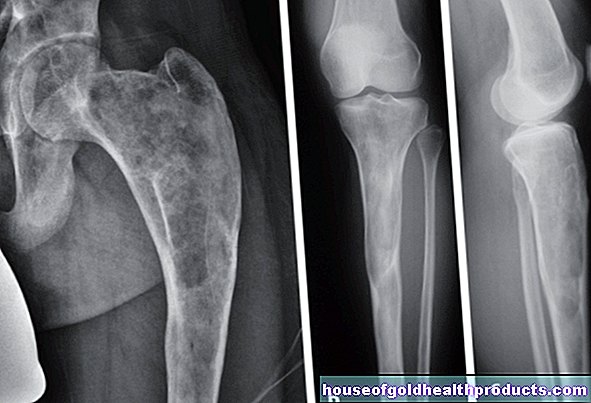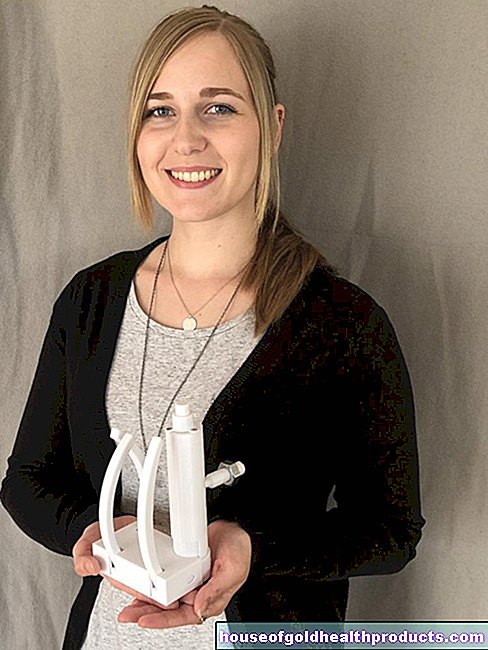Macrogol
Updated on All content is checked by medical journalists.The laxative macrogol is used for colon cleansing before bowel exams and to treat constipation. It binds water, which increases the volume of the stool and makes the stool softer. That makes bowel movements easier. In general, laxatives should only be taken after consulting a doctor. Here you can read everything you need to know about macrogol.
This is how macrogol works
Macrogol is an active ingredient from the group of laxatives with water-binding and laxative properties. The increased binding of water in the gastrointestinal tract causes, on the one hand, an increase in the volume of the stool, which stimulates intestinal activity (peristalsis), and on the other hand, it makes the stool softer.
Laxatives may be needed when digestion is impaired. A slower intestinal passage can be caused, for example, by poor diet, lack of exercise and occasionally also by taking certain medications (for example strong painkillers from the group of opioids).
Certain diseases (such as multiple sclerosis) can also lead to constipation. In the short term, laxatives can then be used to facilitate defecation.
Macrogol, also known as polyethylene glycol, is a man-made substance that binds water. If macrogol is taken by mouth (orally), the substance binds the water present in the intestine and prevents it from being absorbed into the blood through the intestinal wall - it remains in the intestinal contents (stool).
Macrogol takes about 12 to 48 hours to take effect.
Uptake, breakdown and excretion
The active ingredient is not absorbed from the intestine into the blood, but excreted unchanged in the stool.
When is macrogol used?
Macrogol is a highly effective laxative and is used for colon cleansing before intestinal examinations and surgical interventions in the gastrointestinal tract. It is also used to treat chronic constipation and problems with passing stool.
Indicated ("indicated") is the short-term use of laxatives, for example in women shortly after giving birth (so that they do not have to press hard when defecating). The same applies to patients who have had an operation on the abdominal wall and therefore have pain when tensing the abdominal muscles.
Long-term use is only recommended in special cases such as paraplegics and patients who take strong pain relievers (opioids). Combination preparations that contain macrogol and salts (electrolytes) are advisable here. In this way, you can prevent an impending electrolyte deficiency by accelerating bowel movements to a certain extent.
Regular use of laxatives such as macrogol without a medical examination is strongly discouraged. A long-term constipation should always be clarified by a doctor in order to rule out possible pathological causes.
This is how macrogol is used
Macrogol is mostly used as a powder to make a solution. The contents of a macrogol bag are stirred into water and drunk.
For a complete colon cleansing before medical interventions, between three and four liters of macrogol solution must usually be drunk (according to the doctor's instructions). For a slight laxative effect in the case of temporary constipation, significantly smaller amounts are required.
What are the side effects of macrogol?
Macrogol often causes side effects such as gastrointestinal problems, i.e. in one to ten percent of those treated.
Severe diarrhea is possible if the laxative is overdosed.
Long-term use of laxatives without the addition of electrolytes can lead to electrolyte losses. This gives the body the impression that the food is passing through the intestines too quickly. As a countermeasure, it slows down the gastrointestinal movement even further. This fatal regulation also promotes the existing constipation. Many patients then take even more laxatives - the vicious circle intensifies.
Always have a doctor clarify constipation with acute symptoms (including pain, nausea, strong feeling of pressure).
What should be considered when taking macrogol?
Contraindications
Macrogol must not be used in:
- Intestinal obstruction
- Gastrointestinal bleeding
- severe inflammatory bowel disease (Crohn's disease, ulcerative colitis)
- Hypersensitivity to the active substance or any other component of the preparation
Interactions
There is a possibility that macrogol may affect the absorption of other drugs.
Age restriction
Finished preparations with macrogol are approved from the age of one year, depending on the dosage. Elderly patients, patients with inflammatory bowel disease and those with cardiac arrhythmias should use macrogol drugs with caution, preferably only under medical supervision.
pregnancy and breast feeding period
So far, there are insufficient data on the use of macrogol during pregnancy and breastfeeding. Since the active ingredient is practically not absorbed from the intestines into the bloodstream, experts assume that it can be used throughout pregnancy and breastfeeding if swelling agents such as flaxseed and flea seeds are not effective.
Macrogol is one of the laxatives of choice during pregnancy and breastfeeding.
How to get macrogol medication
Drugs containing macrogol are available over-the-counter in pharmacies in Germany, Austria and Switzerland.
Tags: news teenager drugs


.jpg)



















.jpg)






